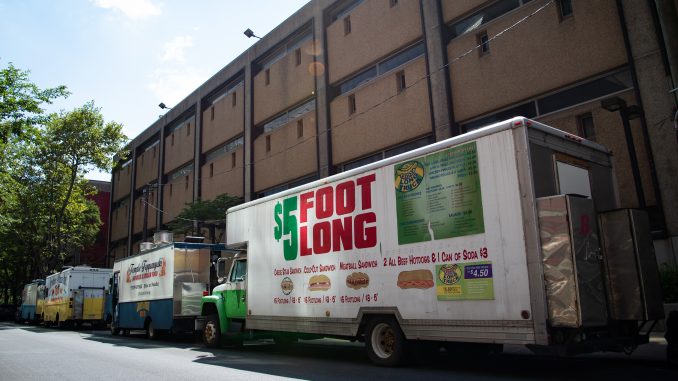
For returning students and faculty, the procedures are clear: wash hands, wear a mask, stay six feet apart and follow the signs.
But for campus food trucks, there’s no one to look to for guidelines.
With Temple University’s hybrid class schedules and many students learning from home due to the COVID-19 pandemic, vendors are unsure how much business they will get. Many food trucks are having to rethink how, or even if, they should reopen.
On Aug. 14, the university released guidelines on food service operations outlining safety measures for those in campus buildings. It did not include policies for food trucks or other outdoor independent vendors, like those located at The Wall.
“Financially, you have to open up,” said Sylvia Ndreu, owner of the Foot Long food truck located at 12th and Norris streets. “For some of us, [the food truck] is our sole business.”
Foot Long stayed on-campus even when students left, as vendors aren’t allowed to move their truck to a different location without applying for new licensing, Ndreu said.
Food truck vendors on campus are regulated by the City’s Department of Licenses and Inspections and the Department of Public Health and do not pay rent to the university, wrote Morgan Zalot, a spokesperson for the university.
A representative from Temple’s Office of Community Relations reached out to each food truck vendor with information about Main Campus public health measures and food truck operations, Zalot further wrote. They plan to follow up with health department regulations and a copy of the city food truck ordinance, Zalot added.
Ndreu typically reduces hours during the summer months when many students leave campus, she said. Due to the pandemic, they lost an additional six weeks of business when students left campus in the spring.
She tried to apply for small business financial aid, but because she has fewer than five employees, she was ineligible, Ndreu said.
“This whole year has been devastating for a lot of people, for a lot of small businesses,” she said.
Feim Amzovski owns Fame’s Famous Pizza, located at The Wall. Amzoski applied and was approved for financial aid from the City of Philadelphia, but has not received the money yet, he said.
Vendors at The Wall were offered a deferment of rent during the time campus was closed, which will be paid off at zero percent interest through the next 18 months, wrote Temple Director of Real Estate Linda Frazier.
“They don’t even talk to us anymore,” Amzovski said. “They just sent an email: pay your rent on the first.”
Fame’s soft opening for the semester was on Aug. 17, Amzovski said. They have a plexiglass screen installed at their window and are requiring workers to wear face shields, masks and gloves.
Zahrah Surratt, a sophomore health professions major, started to see lines forming around the food trucks again, which will increase as more people return to Temple, she said. Because of the rising number of COVID-19 cases among students, she does not feel comfortable eating at the trucks often, she said.
“I’ve seen the counter of cases on campus … it’s making me be even more cautious,” Surrat said. “I do miss [the food trucks], but I’d rather be safe than sorry.”
There have been 10 active cases of COVID-19 reported on and off campus as of Monday night, according to the university’s COVID-19 dashboard.
Richie’s sandwich shop at The Wall suspended operations March 18 after campus closed March 13. They reopened locations at The Wall and at Richie’s Cafe in the Kardon/Atlantic Terminal Building, but Richie’s Lunch Box food truck, at 12th and Norris streets, will remain closed until further notice, owner Richie Jr. tweeted on Aug. 18.
“It’s hard because we depend on the students,” Richie Jr. said. “I know for a fact a lot of vendors are struggling on the personal side, because this was something that was not expected.”
Richie Jr. is also concerned about the two months of business he will lose as students complete the semester online off campus on Nov. 20, returning for the spring on Jan. 11, 2021, he said.
“We’re really trying to make it work with Temple, but we feel left out with this whole process,” Richie Jr. said. “We’re trying to be hopeful, but we also need to be realistic at the same time.”
Richie Jr. said their locations follow the Centers for Disease Control and Prevention’s guidelines for health and safety in the workplace, will be making their menus available online and taking call-in orders to reduce crowding at their service windows.
The staff at the Foot Long Truck will be wearing masks and gloves, and plexiglass has been installed at their window, Ndreu said.
“We just hope our students come back and support us so we can get ahead again,” Ndreu said. “You’ve gotta take it day by day. It’s a very different time, everybody has to adapt.”


Be the first to comment